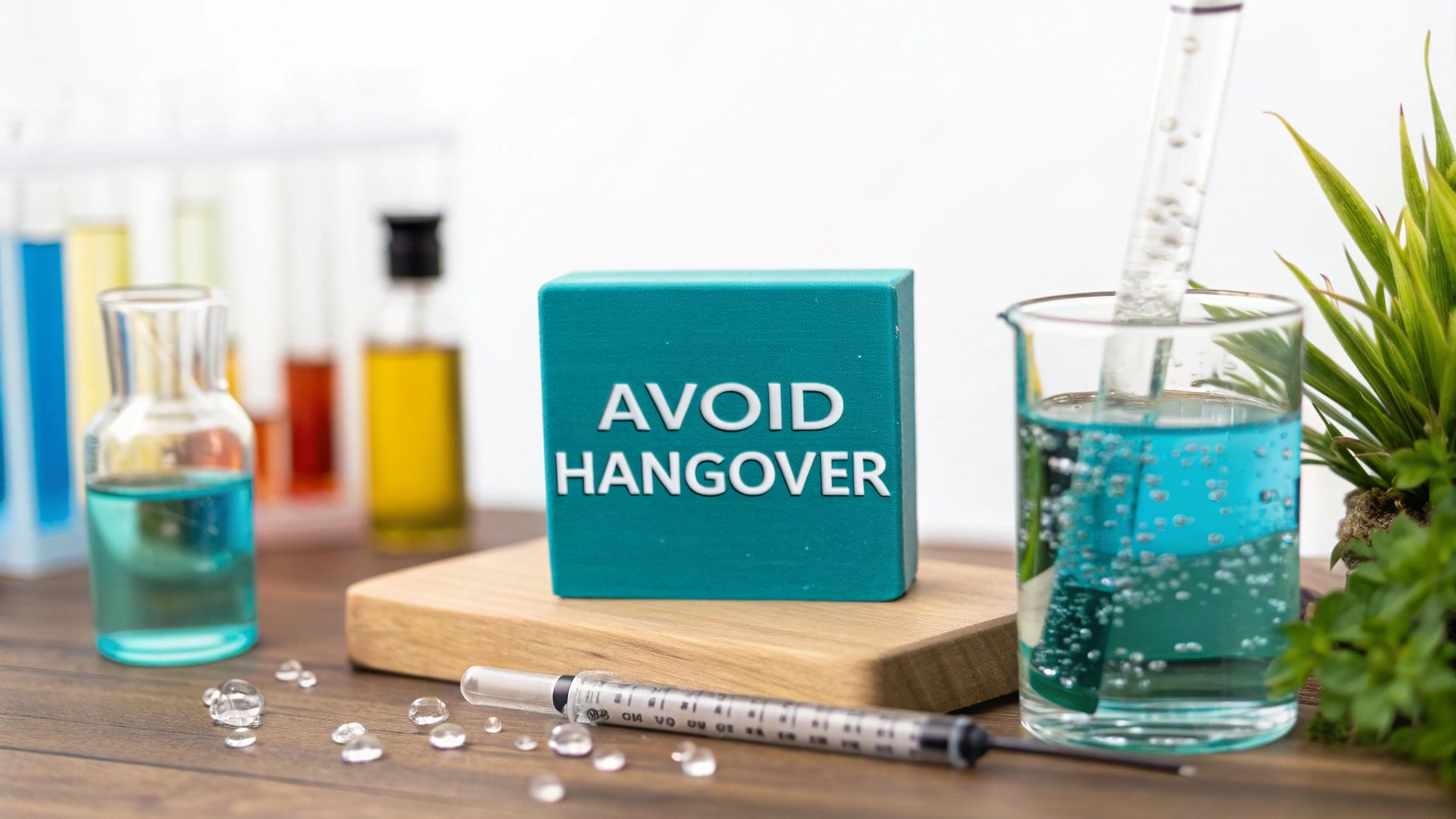

· By Annemarie
How to Avoid Hangover Headache: 7 Science-Backed Solutions
The Science Behind Your Throbbing Head
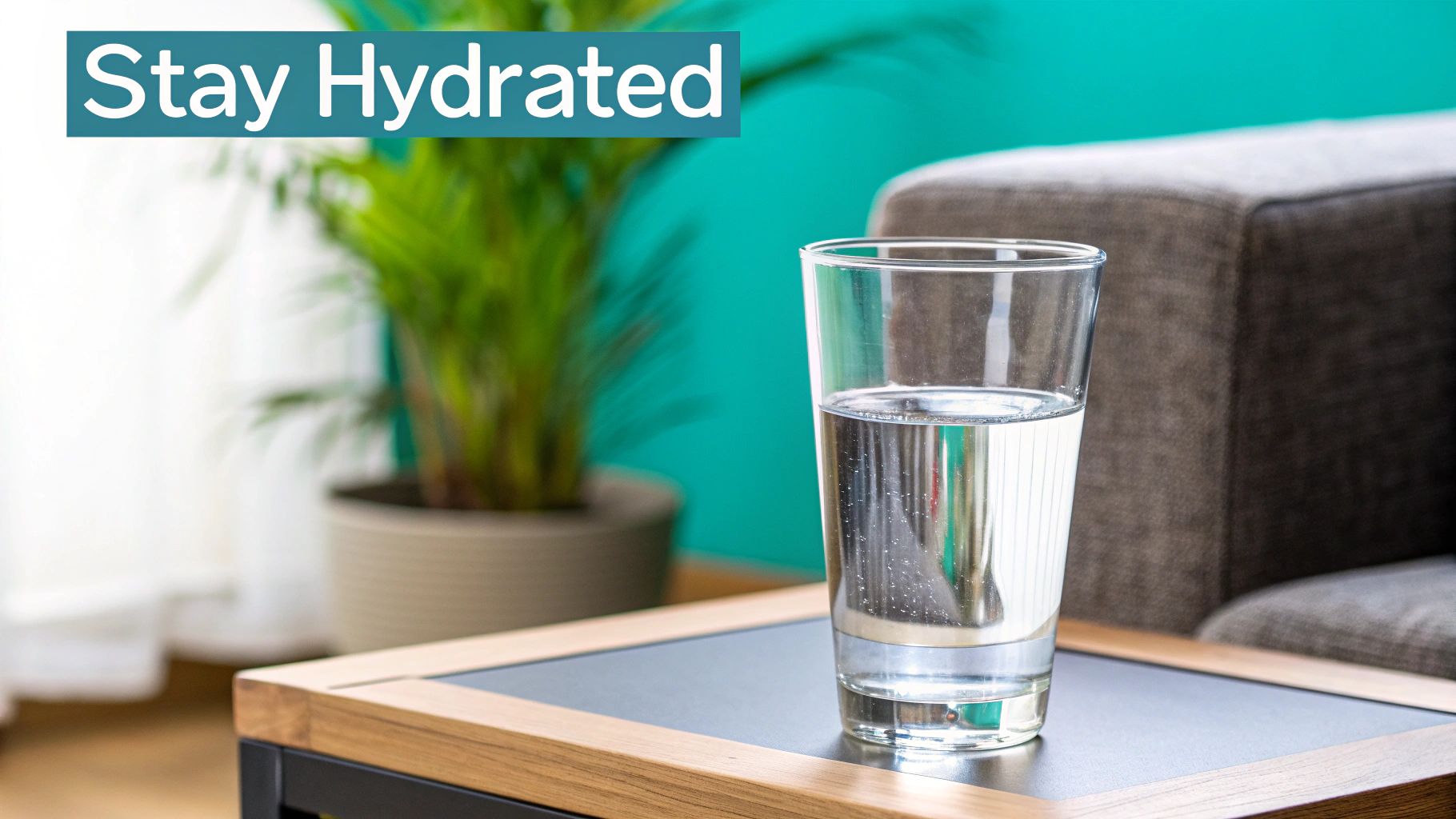
That pounding headache after a night out isn't just dehydration. It's a complex physiological reaction involving several factors. One major culprit is acetaldehyde, a toxic byproduct created when your body processes alcohol. This compound is responsible for many unpleasant hangover symptoms, especially that dreaded headache. Alcohol also disrupts sleep, even if you get a full eight hours. This poor sleep quality adds to the next-day misery.
The Role of Dehydration and Inflammation
Alcohol is a diuretic. This means it makes you urinate more, leading to dehydration. Dehydration causes blood vessels in the brain to constrict, resulting in a throbbing sensation. Think of a garden hose losing water pressure; it shrinks. Dehydrated blood vessels react similarly, causing pain.
Alcohol also triggers inflammation throughout the body, increasing discomfort. This inflammation can worsen the headache and contribute to other symptoms like nausea and fatigue.
Why Some Suffer More Than Others
Why do some people seem immune to hangovers while others suffer immensely? Genetics, alcohol tolerance, and the types of alcoholic drinks consumed all play a role. Some people naturally process alcohol more effectively.
Furthermore, understanding hangover prevalence is key to avoiding them. In a large study, 72% of participants aged 25-64 reported experiencing hangover headaches. This makes it the most common headache type in that age group. Learn more about hangover prevalence. This research also underscored the importance of hydration and potential benefits of Vitamin B6.
Different alcoholic beverages contain varying levels of congeners. These are chemical byproducts of fermentation that increase hangover severity.
Understanding the Mechanisms for Effective Prevention
This mix of dehydration, inflammation, and individual responses shows why a well-rounded approach to hangover prevention is essential. Drinking water after a night out isn't enough.
Strategies like pre-drinking hydration, smart food choices, and understanding your body's needs are crucial for truly avoiding that throbbing head. How to master your website architecture. This knowledge is fundamental to understanding how products like Upside Hangover Sticks address the root causes of hangovers, not just the symptoms.
Strategic Hydration: Your First Line of Defense
Staying hydrated is key to avoiding those dreaded hangover headaches. But simply chugging water after a night out isn't the most effective approach. A more science-backed strategy involves hydrating before, during, and after you enjoy alcoholic beverages.
Hydration Before, During, and After Alcohol
Think of your body like a sponge. A dry sponge absorbs liquid rapidly, while a damp one absorbs it more gradually and evenly. Pre-hydrating is like dampening the sponge, preparing your body to better handle the dehydrating effects of alcohol.
-
Before: Begin hydrating a few hours before you start drinking. Aim for 8-16 ounces of water to get a head start.
-
During: Keep drinking water throughout the evening. Alternate alcoholic drinks with water – a glass of water for every alcoholic beverage is a good rule of thumb. This helps maintain a steady hydration level.
-
After: Before heading to bed, drink another 8-16 ounces of water. This final hydration boost helps minimize the dehydrating effects that continue as you sleep.
Electrolytes: Hype or Help?
Alcohol depletes not only water but also vital electrolytes like sodium and potassium. These electrolytes play a key role in nerve and muscle function, and their loss contributes to hangover symptoms.
While sports drinks are often touted as hangover cures, plain water is usually enough for rehydration. However, if you’ve been sweating a lot or being active while drinking, adding electrolytes can be beneficial. Upside Hangover Sticks offer a convenient way to replenish those lost electrolytes, helping you recover faster.
To illustrate the best and worst choices for hydration, let's take a look at the following table. It compares different beverages and their effectiveness in preventing and treating hangover headaches.
Hydration Heroes and Zeroes
Comparison of different beverage options for preventing and treating hangover headaches
| Beverage Type | Hydration Efficiency | Electrolyte Content | Sugar Content | Recommended Timing |
|---|---|---|---|---|
| Water | High | Low | None | Before, during, after |
| Coconut Water | Moderate | Moderate | Moderate | During, after |
| Sports Drinks | Moderate | Moderate | High | During, after |
| Sugary Sodas | Low | Low | Very High | Avoid |
| Caffeinated Drinks | Low | Low | Varies | Avoid |
As you can see, water remains the champion for hydration. Coconut water provides a good balance of hydration and electrolytes. Sugary drinks can worsen dehydration because your body needs more water to process the sugar. Caffeinated beverages act as diuretics, further dehydrating you.
Recognizing Your Body's Signals
Paying attention to your body's cues is essential for effective hydration. Thirst is an obvious indicator, but also watch out for dry mouth, headaches, and fatigue. These are all signs that you need to increase your fluid intake.
By following this strategic hydration plan and listening to your body, you can significantly reduce your risk of waking up with a pounding hangover headache. You'll be more likely to feel refreshed and ready to take on the day. Upside Hangover Sticks can be a useful addition to your hydration toolkit, supporting your body's natural recovery process.
Eat Smart: Food Strategies That Actually Work
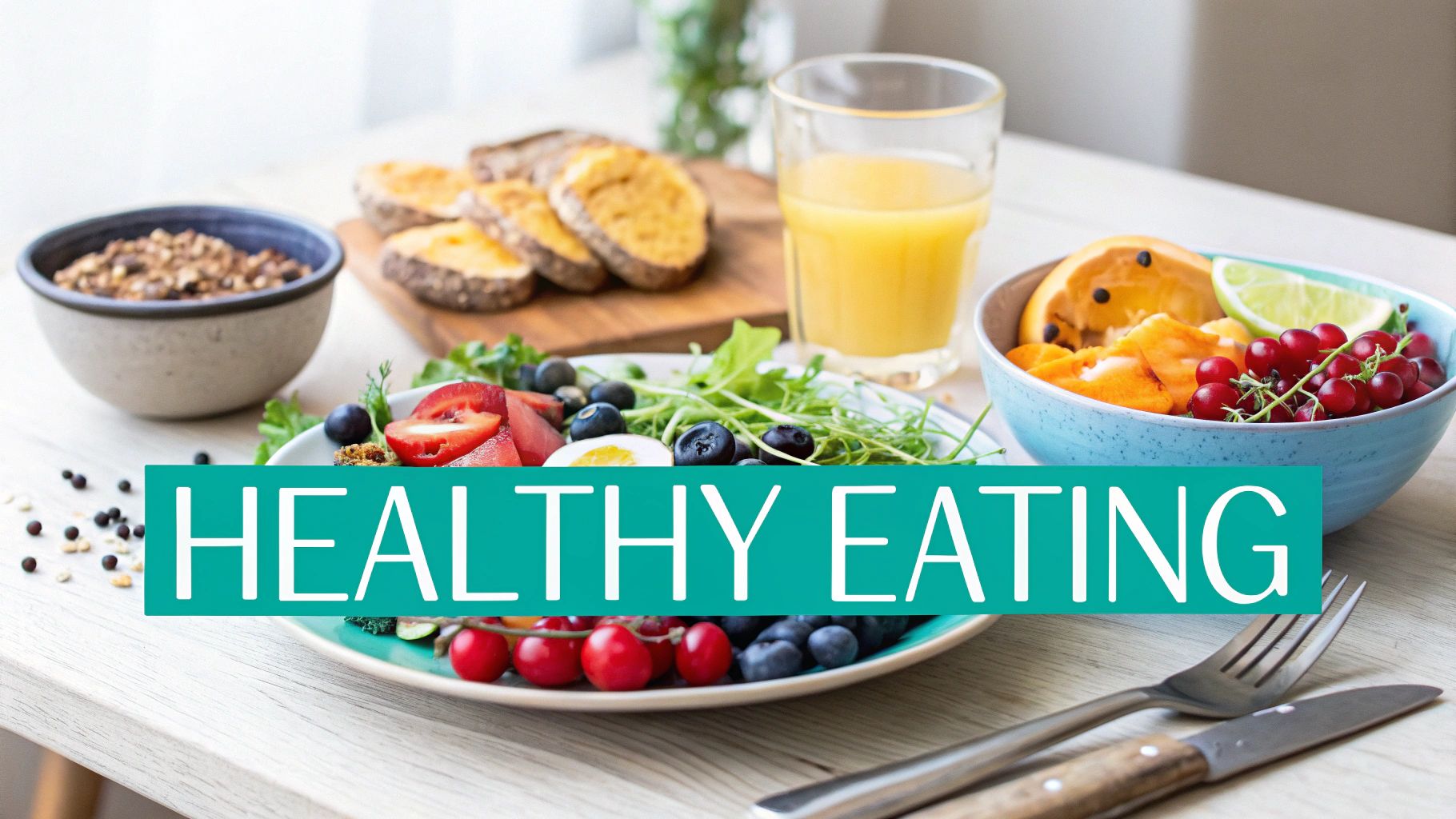
What you consume before, during, and after drinking can significantly affect how you feel the next day. Choosing the right foods can help minimize those dreaded hangover headaches by supporting your body's natural recovery processes.
The Importance of Pre-Drinking Nutrition
Eating a balanced meal before you have your first drink can help slow the absorption of alcohol. This gives your body more time to process it, lessening its negative effects. Essentially, food acts as a buffer in your stomach, absorbing some of the alcohol before it reaches your bloodstream.
-
Protein Power: Protein is essential for slowing alcohol absorption. Include lean protein sources like chicken, fish, or beans in your pre-drinking meal.
-
Healthy Fats: Incorporating healthy fats, like those found in avocados or nuts, can also be beneficial. These fats further slow alcohol absorption, softening the impact.
-
Complex Carbohydrates: Choose complex carbohydrates like whole grains over refined carbohydrates. These provide sustained energy and help maintain stable blood sugar levels.
Smart Snacking During Social Events
Maintaining steady blood sugar levels throughout the evening can make a world of difference. Alcohol disrupts blood sugar regulation, contributing to hangover symptoms. This is where smart snacking comes in.
-
Protein-Rich Snacks: Keep protein-rich snacks readily available during social events. Nuts, cheese, or hard-boiled eggs are all great portable options.
-
Fruit: Fruit is another smart choice, providing natural sugars and vitamins to support your body.
Recovery Breakfasts
After a night of drinking, your body needs replenishment. Focus on a breakfast that helps you recover and eases any lingering hangover symptoms.
-
Electrolyte-Rich Foods: Incorporate electrolyte-rich foods like bananas and spinach. These help rehydrate and restore balance.
-
Antioxidant-Boosting Foods: Berries and other antioxidant-rich foods can help fight inflammation caused by alcohol.
To learn more about helpful resources, check out this guide on website indexing.
Practical Meal Planning Examples
Here are a few examples of meals and snacks that can help you prevent hangover headaches:
Pre-Drinking Dinner: Grilled salmon with roasted vegetables and quinoa offers a balanced combination of protein, healthy fats, and complex carbohydrates.
Strategic Snacks: Keep almonds, string cheese, or fruit slices handy at your next gathering.
Recovery Breakfast: A smoothie with banana, spinach, berries, and protein powder provides a nutrient-rich and easy-to-digest start to your day.
Let's take a closer look at some key foods and their benefits for hangover prevention. The following table provides a helpful overview:
Power Foods for Hangover Prevention Nutrient-rich foods to consume before, during, and after drinking to prevent headaches
| Food Category | Key Nutrients | Benefits for Hangover Prevention | Ideal Timing |
|---|---|---|---|
| Lean Protein (Chicken, Fish, Beans) | Protein, amino acids | Slows alcohol absorption, supports repair | Before drinking |
| Healthy Fats (Avocados, Nuts) | Monounsaturated fats, Vitamin E | Slows alcohol absorption, protects cells | Before drinking |
| Complex Carbs (Quinoa, Whole Grains) | Fiber, B vitamins | Stabilizes blood sugar, provides sustained energy | Before drinking |
| Nuts & Seeds (Almonds, Pumpkin Seeds) | Protein, healthy fats, magnesium | Maintains blood sugar, provides electrolytes | During drinking |
| Fruit (Bananas, Berries) | Potassium, antioxidants, natural sugars | Replenishes electrolytes, fights inflammation | During & After drinking |
| Leafy Greens (Spinach, Kale) | Folate, magnesium, electrolytes | Supports liver function, rehydrates | After drinking |
This table highlights the importance of incorporating specific nutrients to combat the effects of alcohol. By focusing on these key food groups, you can significantly improve how you feel after a night out.
By making smart food choices, you're not just fighting hangover headaches; you're promoting better overall well-being.
Supplement Savvy: Separating Science From Snake Oil
Navigating the supplement aisle can be overwhelming for anyone looking to ease a hangover. Countless products promise quick relief, but discerning effective supplements from clever marketing requires a closer look at the science. Let's explore some popular options for minimizing hangover headaches.
Vitamins and Alcohol Metabolism
Certain vitamins play a key role in how your body processes alcohol. B vitamins, especially B1 (thiamine) and B6 (pyridoxine), are depleted when you drink alcohol. Supplementing with these vitamins can help support your body's natural detoxification process.
The Potential of Amino Acids
Some amino acids, like N-acetyl cysteine (NAC), have shown promise in research. NAC is a precursor to glutathione, an antioxidant that helps protect the liver from alcohol-induced damage. This protection could indirectly reduce hangover symptoms.
Timing is Key for Supplement Effectiveness
Just like staying hydrated, the timing of when you take supplements matters. Taking certain supplements before, during, or after drinking can significantly impact how well they work. For example, taking NAC before you drink might offer better protection against liver stress.
Examining the Evidence: NAC, Milk Thistle, and B Vitamins
While anecdotal evidence for various supplements is plentiful, scientific backing is often limited. Research into hangover treatments and preventions, including supplements, has shown some promising results but often lacks conclusive evidence. For example, a 2021 study indicated positive effects of a specific hangover prevention supplement in lessening symptoms, especially headaches. However, the small pilot trial didn’t achieve statistical significance. Other potential treatments, including various vitamins and compounds, also require larger, more comprehensive studies. Explore this topic further. This underscores the importance of a well-rounded approach, including hydration, rest, and potentially helpful vitamins or supplements.
-
NAC: Studies suggest NAC can replenish glutathione, potentially reducing liver damage and improving overall hangover symptoms.
-
Milk Thistle: This herb is traditionally used for liver support, but its effectiveness for hangovers needs more robust scientific evidence.
-
B Vitamins: Replenishing B vitamins depleted by alcohol can support your body's metabolic processes, potentially lessening headache severity.
Synergistic Effects and Wasted Money
Some supplement combinations might offer synergistic effects, working better together than individually. Ongoing research continues to explore these potential synergies. However, many commercially available hangover supplements include unproven ingredients or insufficient doses, leading to wasted money.
Dosage and Interactions
Following the recommended dosage for any supplement is essential. Also, be mindful of potential interactions between supplements and medications. Consulting with a healthcare professional is always recommended before starting any new supplement regimen. They can offer personalized guidance based on your individual needs and health. This informed approach empowers you to make smart choices, maximizing potential benefits while minimizing risks. Upside Hangover Sticks offer a targeted approach with clinically researched doses of key ingredients, focusing on proven effectiveness.
Drink Smarter: Choosing Beverages That Won't Betray You
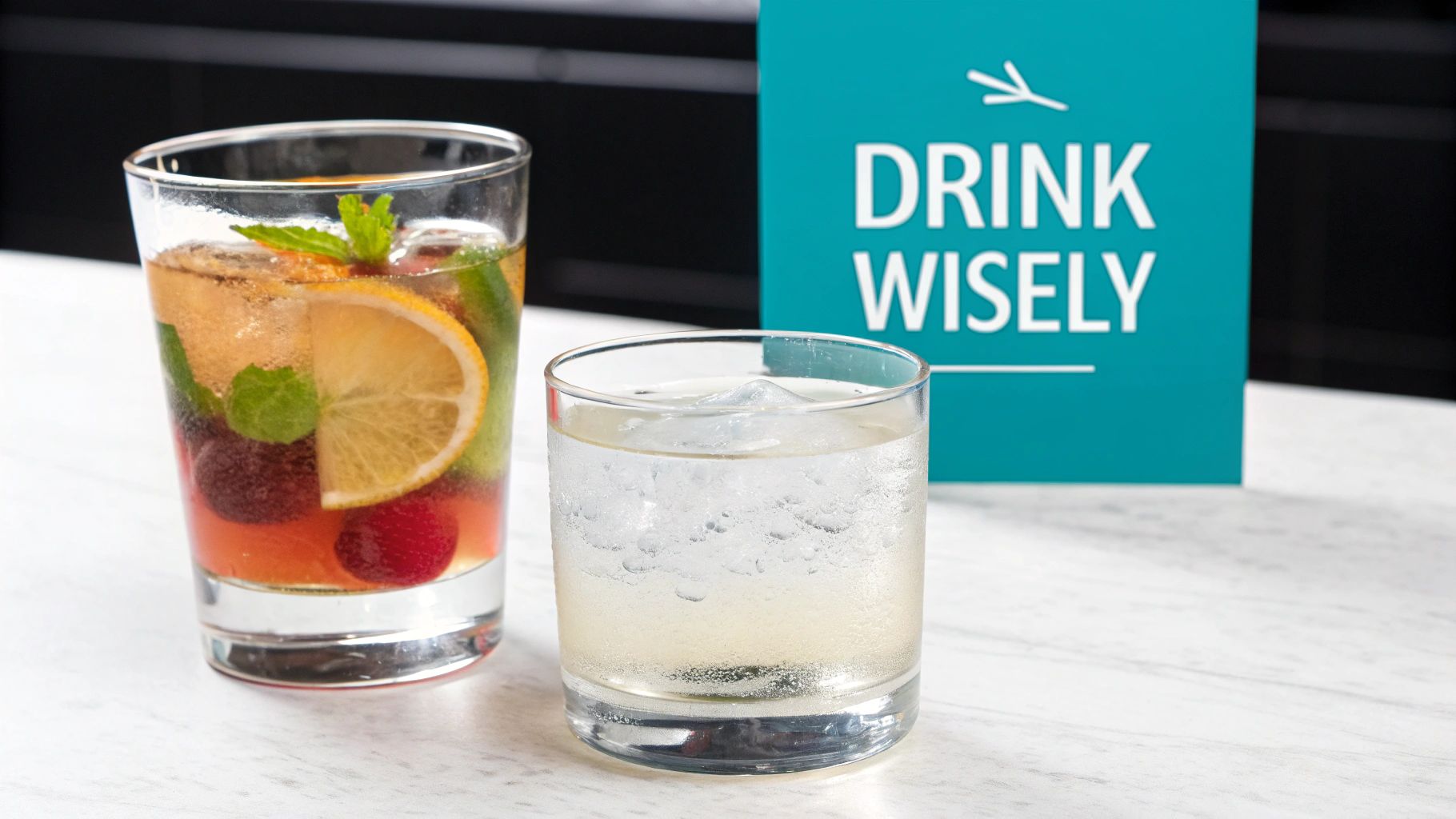
Not all alcoholic beverages are created equal when it comes to hangovers. We've talked about hydration and nutrition, but your drink choice matters too. Let's explore how congeners, alcohol purity, and even mixers affect your next-day experience.
The Congener Conundrum
Congeners are chemical byproducts of fermentation. They give drinks their flavor and color, but also worsen hangovers, especially headaches. Darker drinks like bourbon, whiskey, and red wine are typically higher in congeners.
This means a richer flavor often comes with a harsher hangover. For example, tequila shots are more likely to cause a severe headache than vodka sodas, assuming all other factors are the same.
Alcohol Purity and Hangover Severity
The purity of the alcohol matters. Cheap liquors often contain more impurities, leading to worse hangovers. Higher-quality, distilled spirits tend to be purer and easier on your system. You don't have to buy top-shelf, but choosing reputable brands can help.
Mixing Matters: Amplifying Hangover Intensity
Mixers can significantly affect hangover severity. Sugary mixers add calories and dehydrate you because your body uses water to process sugar. Artificial sweeteners and additives can also upset your stomach.
Carbonated mixers can speed up alcohol absorption, leading to faster, more intense intoxication and a potentially worse hangover.
Strategic Substitutions and Pacing
You might be interested in: How to master your website architecture.
Smart substitutions can help you enjoy social drinking without the pain. Consider lighter drinks instead of dark liquors. Choose vodka or gin over whiskey, or white wine over red.
- Instead of Bourbon: Try Vodka Soda with Lime
- Instead of Red Wine: Try White Wine Spritzer
- Instead of Dark Beer: Try Light Beer or Hard Seltzer
Pacing is another key strategy. Sip your drinks slowly instead of gulping. This allows your body to process the alcohol, lessening the impact. Alternating alcoholic drinks with water further moderates your intake and prevents dehydration.
Understanding the Recipe for Head Pain
By understanding how alcohol concentration, congeners, additives, and production methods affect hangover headaches, you can make better choices. Select drinks you enjoy without sacrificing your well-being the next day. This lets you enjoy social events and minimize the risk of a debilitating hangover. Remember, Upside Hangover Sticks can further support your efforts by providing a targeted blend of ingredients to combat hangover symptoms.
Rescue Protocol: When Prevention Plans Fail
Even with the best laid plans, sometimes a hangover headache can strike. Instead of turning to questionable folk remedies, let's explore a science-backed recovery plan based on how your body processes alcohol and its impact on the brain.
Pain Relief: The Right and Wrong Choices
When a hangover headache hits, it's natural to want pain relief. However, it's important to choose wisely. NSAIDs like ibuprofen can be effective for reducing inflammation and pain. However, they can also irritate the stomach, which might already be sensitive after a night of drinking. Acetaminophen (Tylenol) should be avoided entirely while alcohol is still in your system, as the combination can put extra stress on the liver. As always, consult your physician or other qualified healthcare professional for any health concerns.
Beyond Pain Relief: Addressing the Root Causes
Effective hangover recovery goes beyond just masking the pain. Addressing the root causes, like dehydration and disrupted sleep, is crucial for feeling better faster. Replenishing electrolytes lost through alcohol’s diuretic effect is essential.
-
Electrolyte Replenishment: Consider an electrolyte solution like a sports drink to rehydrate and restore balance. Upside Hangover Sticks are a convenient way to replenish key electrolytes such as potassium and magnesium.
-
Prioritize Rest: Alcohol disrupts sleep, even if you log a full night. This disruption can worsen headache pain. Prioritizing rest and giving yourself time to recover is essential.
Rest and Recovery: The Importance of Sleep
Alcohol, while initially seeming to promote sleep, actually disrupts sleep cycles. This leads to poor quality rest and intensifies hangover symptoms. As mentioned above, alcohol can disrupt REM sleep, impacting your ability to process and consolidate memories.
-
Create a Relaxing Bedtime Routine: A warm bath or shower, calming music, and a dark, quiet bedroom can help improve sleep quality after drinking.
-
Avoid Caffeine and Nicotine Before Bed: Both stimulants can further disrupt sleep, hindering recovery.
The Constellation of Hangover Symptoms
Hangover headaches rarely occur alone. They're often accompanied by nausea, fatigue, and anxiety. Addressing these accompanying symptoms contributes to overall recovery.
-
Nausea Relief: Ginger tea or plain toast can help settle an upset stomach.
-
Combat Fatigue: Small, frequent meals can help stabilize blood sugar and fight fatigue.
-
Managing Hangxiety: Gentle exercise, such as a walk in nature, can help ease anxiety and improve mood. For more information on hangxiety, visit this informative article: What is hangxiety? How to avoid the dreaded hangover anxiety.
When to Seek Medical Attention
While most hangover headaches resolve within 24 hours, some situations require medical attention. If you experience severe, persistent headaches, vomiting, confusion, or other concerning symptoms, seek medical care immediately. These could be signs of a more serious condition. If hangovers are impacting your daily life or relationships, speak with a healthcare professional. They can provide guidance and support for managing alcohol consumption.
By following these strategies and prioritizing rest and rehydration, you can effectively manage hangover headaches and get back to feeling your best. Upside Hangover Sticks can be a valuable tool in your recovery, providing a convenient way to replenish lost electrolytes and support your body’s natural healing process.
Your Personalized Hangover Defense System
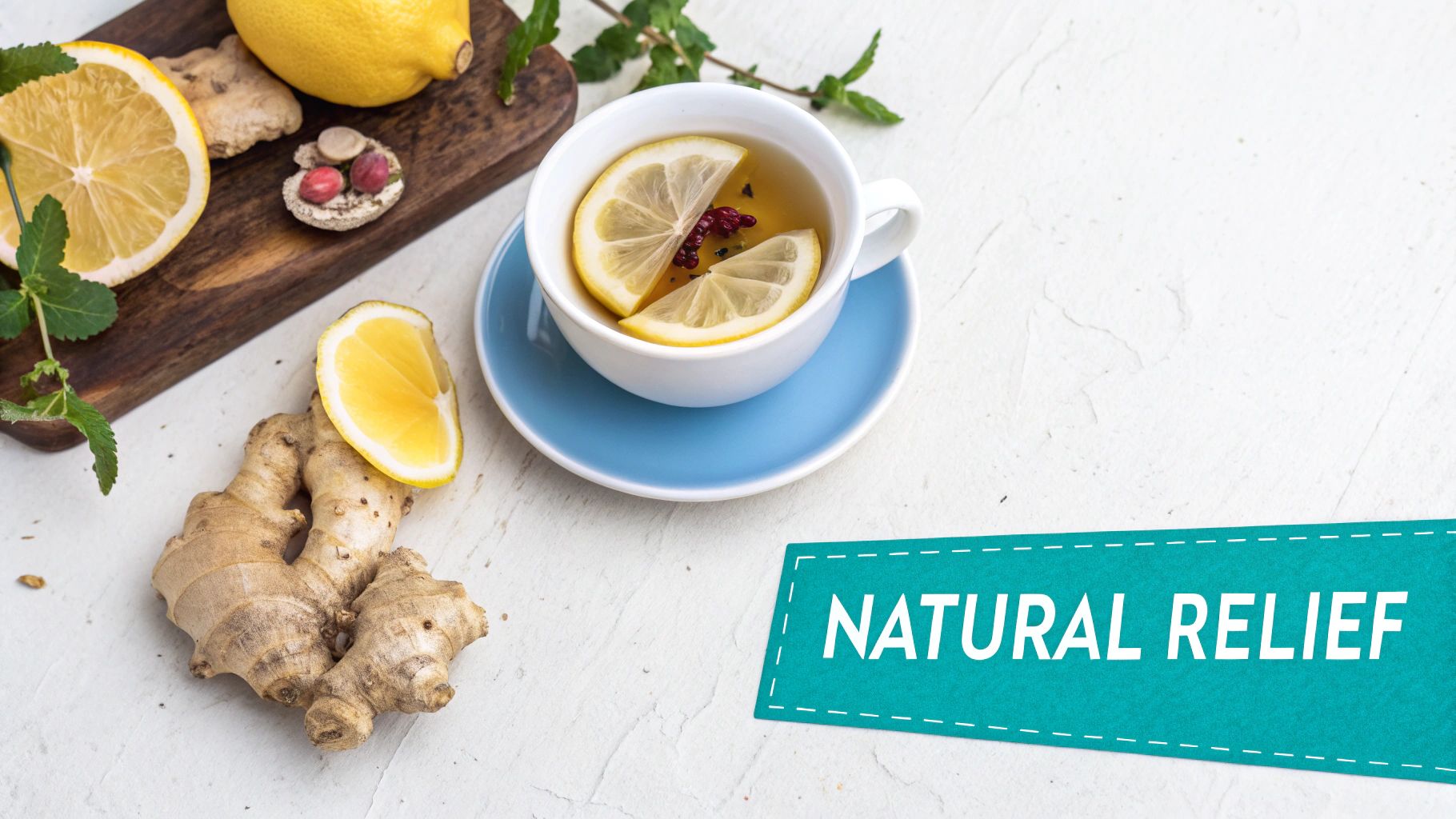
Your body's response to alcohol is unique. Factors like genetics, weight, and even your recent meals influence how you metabolize alcohol and experience its after-effects. This means a generic approach to avoiding hangovers just won’t cut it. You need a personalized strategy, and this section will help you build one.
Understanding Your Hangover Vulnerabilities
The first step is understanding your specific vulnerabilities. Reflect on past hangovers. Do you always get a headache? Are you more sensitive to certain types of alcohol? Analyzing your patterns reveals important clues.
For example, if red wine consistently triggers headaches, you might be sensitive to congeners. If you wake up anxious after a few drinks, explore the link between alcohol and hangxiety. This helpful article offers insights: What is hangxiety? How to avoid the dreaded hangover anxiety. This self-assessment builds a foundation for targeted strategies.
Targeted Interventions for Maximum Effectiveness
Once you've identified your vulnerabilities, you can implement targeted interventions. If dehydration is a recurring problem, prioritize pre-hydration and alternate alcoholic beverages with water. If certain foods worsen your symptoms, adjust your diet.
The goal is proactive planning, not just reacting to a hangover after it hits. If your hangover persists, consider finding some relaxing chill spots to recover.
Adapting Your Approach to Social Situations
Social situations involving alcohol vary widely, from casual get-togethers to formal events. Your approach to hangover prevention should be equally adaptable. A business dinner, for instance, might require different strategies than a celebratory night out.
This adaptability ensures you can enjoy social events without constantly dreading the next morning. Knowing how to adjust your strategies empowers you to navigate various situations while minimizing your hangover risk.
Your Personal Hangover Prevention Checklist
Here's a practical checklist you can keep on your phone, ensuring you're prepared before, during, and after social events:
Before:
- Hydrate: Drink 8-16 ounces of water.
- Eat a balanced meal with protein, healthy fats, and complex carbohydrates.
- Consider supplements like B vitamins or NAC (consult your doctor first).
During:
- Alternate alcoholic drinks with water.
- Choose lower-congener drinks.
- Pace yourself and avoid gulping.
- Snack on protein-rich foods.
After:
- Drink another 8-16 ounces of water before bed.
- Take a pain reliever if needed (avoid acetaminophen).
- Prioritize a good night's sleep in a cool, dark room.
- Replenish electrolytes.
By implementing these personalized strategies, you're building a proactive defense against hangover headaches. You're taking control, ensuring you can enjoy social drinking without the regret.
Ready to take your hangover prevention further? Upside Hangover Sticks offer a convenient and targeted approach with a blend of electrolytes and other beneficial ingredients, designed to support your body's recovery and minimize the negative effects of alcohol. Visit https://enjoyupside.com to learn more and take control of your mornings.
